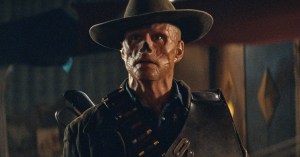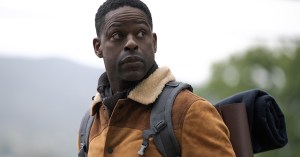RT-UK: Patrick Marber Interview
Oscar nominated screenwriter, Patrick Marber, talks Notes on a Scandal exclusively with Rotten Tomatoes UK.
 It’s not yet lunchtime, but Patrick Marber looks exhausted. Today’s international press junket for Notes on a Scandal is clearly taking its toll on the Oscar nominated screenwriter.
It’s not yet lunchtime, but Patrick Marber looks exhausted. Today’s international press junket for Notes on a Scandal is clearly taking its toll on the Oscar nominated screenwriter.
Nevertheless he’s keen to welcome Rotten Tomatoes UK warmly into the room – thrilled to be chatting to the staff of one of his favourite Web resources, or so he says. We’re touched. So warm is his welcome that when his publicist brings a plate of biscuits in for him he wastes no time in insisting we take a couple. And let this be a lesson to budding journalists the world over; talking with a biscuit in your mouth is not the easiest task in the world.
And talk is what we’ve come here to do and we’re keen to get on with it. Over half an hour, Patrick Marber takes Rotten Tomatoes UK exclusively through the process of shaping Notes on a Scandal.
RT-UK: How did you become involved originally with the adaptation?
Patrick Marber: I was sent the book, originally, by the producer Scott Rudin. I read the book and pretty much accepted right there. I thought the book was fantastic; very funny, very odd and I thought Barbara was an amazing character. She was an unusual movie character, potentially. It’s very rare you get such a tough, bitchy, funny older woman driving a film. It’s not On Golden Pond! I thought she’d be fun to write.
I thought Sheba needed a bit of work to make her a fully-realised movie character because in the book she’s only seen from Barbara’s point of view. She doesn’t fully come alive as an entity.
RT-UK: I guess when she’s referring to Sheba you’re actually learning more about Barbara.
PM:Exactly. Yeah, so I knew that in the film I needed a way to access who Sheba was and invent scenes with her and the kid and the family that weren’t necessarily in the book.
RT-UK: I get the impression from the novel that it wasn’t an easy task to make that dynamic work in a different medium.
PM: It was a difficult job to do; I did many, many drafts and I think we shot the twelfth draft. But it was quite rewarding. Not financially, but artistically! It was a fun job but it was tough.
RT-UK: As challenging as it was to write, it had to be the sort of material writers would just jump to adapt; it’s controversial and charged but at the same time not a bit hackneyed or formulaic.
PM: That’s the most exciting thing; the story didn’t play out as a genre piece should. I don’t quite know what the story would be if it was predictable but it was a completely unpredictable series of events. I suppose you know that it’s all going to end horribly on some level – it can’t all work out – but it’s a story where you’re waiting for the car crash to happen. And then when it does happen it’s quite satisfying but it happens in a way that you hadn’t quite predicted.

RT-UK: Its real strength is that it handles its controversial aspects without ever judging its characters. You leave with whatever you put in; Barbara’s ultimately no more the villain than Sheba is.
PM: That’s right, and I think that Fox Searchlight were very encouraging of what we were doing. They never said, “Make it clearer that the film is condemning Sheba.” They just trusted us and they encouraged and let us get on with it; they were really brilliant with this film, I’ve got to say.
RT-UK: Which has got to be pretty risky for a big studio like Fox, even if it is going through its independent production wing…
PM: Yeah, well this is the thing; however many times Fox Searchlight says it, and no matter how many examples of it you see, you find it hard to believe that they’d be so willing. And they genuinely want to make challenging films that, in Hollywood parlance, “Push the envelope.” And you think, “Yeah, yeah, but they don’t really,” but they really do. So you keep waiting for the call that goes, “No, no, no, we’re cutting all this stuff.” And it never comes.
But it was the same with Closer and Sony. I kept thinking, “When’s the call going to come when, ‘F*ck off and die you f*cked-up slag,’ gets cut? Or the internet scene gets toned down?” And it never came. I think because the studios are realising that there is an audience who want to see this stuff. And that, for years, Hollywood has made assumptions about who the audience is. They’re just copping to the fact that there is another audience; a film like Borat just wouldn’t have been made ten years ago.
RT-UK: Perhaps an audience that’s a little less politically-correct than their mainstream audience.
PM: Yeah, but I think that audience is becoming their mainstream audience. The gross for Borat is a sort of mini revolution. I knew it would happen because I know who that audience is – I’m part of that audience. It’s the audience who turn out for comedy gigs and movies like Closer; I know those people.

RT-UK: There’s a school of thought that says the Fox Searchlights and the Warner Independent Pictures and the Sony Classics of the world aren’t about independent film; they’re as interested in making money as their mainstream wing.
PM: Perhaps but I think the majors are going to absorb the niches and it’s all going to change. Sony made Closer; that was a major and they made it without skimping on it. Logically that would have been a Sony Classics or a Fox Searchlight or a Paramount Vantage but the major wanted it. It did have Mike Nichols and Julia Roberts and that really helped, but I think it’s pretty clear that there are the high-end boffo-budget films that are going to make money but then there’s also films like Closer, Notes on a Scandal, Little Miss Sunshine, Sideways… The sort-of fifteen to twenty million dollar films and they’re making money too. I think it’s the midrange films – the films that, as it were, are “good for you” – that are going to find it hard. Those forty-million-dollar, get-a-couple-of-movie-stars, crank-out-some-bullsh*t-script movies.
I think the way it’s going is that people either want the authentic real thing that is low-budget, or the authentic big thing that knows what it is and says, “I’m an effects movie, and I’m a ride.” It’s one or the other and everything in between will die! [Laughs] And the studios get it. They are there to make money, they’re not there to be nice to filmmakers, but vicariously they are by making those low-budget films.
RT-UK: As hands-off as they were though, did you manage to avoid the test screening process?.
PM: No, we still had tests but fortunately the tests went well. I mean, listen, we could be having a totally different conversation if the tests had been bad because then the studio might have reacted in a different way.
RT-UK: Was that the same on Closer?
PM: Closer tested badly. But nothing happened! [Laughs] They released the film and it did well. It did more than $150 million worldwide, it was a great big movie. But then it did have movie stars in it!
The thing about the test screening, though, is that it must mean something because it’s human beings watching your film and telling you what they think of it. You’ve gotta learn from that. Whether you want to accept what they tell you is a whole other board game! Generally speaking, when friends of mind have tested movies and they’ve tested badly they’ve gone, “Test are bullsh*t, they don’t mean a thing,” but when their films test well they go, “Oh yeah, great test. Fantastic.”
RT-UK: You said you shot the twelfth draft of the script; how much changed during production? Were you involved once you’d handed in the shooting script?
PM: Yeah I was on set and there was a lot of writing work in post-production. The film always had voiceover in it from the first draft but the voiceover changed depending on the picture. Richard would cut a scene and I’d have to rewrite a voiceover. That shifted a lot. There was a lot of extra work in the end.
RT-UK: Is there something harrowing about opening up the script having been so isolated before production?
PM: No, I’m used to it. I’ve gotten used to it over the years with plays and I’ve travelled abroad and seen foreign productions of my work so I’m very used to seeing something I wrote get done in lots of different ways and it’s really nice.
I like the varying rhythm of being a writer that you have a period of being in complete isolation where it’s just you and the book and your screenplay and no-one can read it. I love that time, but I also love the period where it becomes public and suddenly a hundred people have read it and they’ve all got opinions. As long as you hold your nerve and you listen to those you think are authentic it’s great. That can be difficult but that’s where experience helps. Experience doesn’t help the writing but it really helps the handling of the notes and the handling of the input which I wasn’t good at handling ten years ago. I’ve gotten better at handling it now.
RT-UK: I guess working with Richard Eyre anyway, who you’ve worked with numerous times in the past, helps.
PM: He’s very respectful and he knows me – we go back years – so that really helps. When he expresses a strong opinion about a line or a scene I take it very seriously.
RT-UK: Is it still exciting to see your work brought to life by tremendously talented people like Judi Dench and Cate Blanchett?
PM: Really exciting. I mean that’s kind-of what it’s about. I’ve got a play on in London at the moment that Rhys Ifans is starring in – Don Juan in Soho – and he’s giving this amazing performance. There’s no greater pleasure than writing a scene or a line and then seeing an actor do it and it’s exactly what you wanted but better. It’s fantastic; it makes you feel as a God! Judi Dench and Cate Blanchett doing it was one of the biggest thrills of my writing life; they’re amazing.
I’ve been really lucky with the actors that have brought my work to life. I hope some of it is talent too; but what it is is that I’m a bit of an actor myself so I write parts for actors. The one thing I know is that they don’t want parts where the character tells you who they are. The actor wants to give a performance; to have good things to say while the writer has trusted them to understand who the character is without having to do a speech. And so I write minimally for them and I think they feel respected that their job is to bring the character to life; not mine. I think I give them a certain amount of freedom.
RT-UK: Which I should imagine is largely where the attraction lies for them…
PM: The upside is you get good actors, the downside is people say that there are too many loose ends, “What are you saying? What is this?” Nothing I write presents the audience with the little gem at the centre of it that is the meaning of it all. I hate that kind of writing. This film doesn’t tell you what to think or what to feel; it just says, “This is what happened, now do with it what you will.”
And Nichols did that with Closer; he absolutely honoured the sort-of mess at the heart of my writing. Though I must admit when I watch other films that come from a similar place to my own I do sometimes get frustrated. I sort-of think, “Why am I watching this? Come on, what’s the thing?” [Laughs] I’m not elusive to kind-of pose, it’s just the way I am. I think I’m a writer because I don’t know exactly what I think about a whole range of things so I want to explore it. I don’t necessarily come to a conclusion.

RT-UK: Are you still doing comedy writing?
PM: Well, I’m sort-of having semi-regular meetings with Steve Coogan to talk about an Alan Partridge film. We talk about and… we’re still talking about it.
RT-UK: And how long has that been going on for?
PM: A couple of years! [Laughs] But we’re never in the same country for long enough to sit down and get any work done.
I think we’re quite enjoying, and will continue to enjoy, years of speculation about it without actually having to actually do anything about it!
RT-UK: Lovely… We’re all just dying to see something happen!
PM: Is the world really desperate for an Alan Partridge movie? It’d have to be something spectacularly surprising for it to be anything other than a disappoint. And we’re conscious of that so we don’t want to do it unless the idea is so compelling that it has to be done. And Steve has had a brilliant movie idea for the character. So, you know, it may happen.
RT-UK: It must be difficult to break out of the half-hour format TV comedy… It certainly didn’t work for Ali G…
PM: It worked for Borat though! But it’s really hard. But we know that about Alan and in a way I think you can make it a strength. There is a way of saying to an audience, “It is ludicrous that this man is on the big screen. He shouldn’t be; what’s he doing there?” He doesn’t belong there – we know that, but he doesn’t know that! I think there’s a way of making that part of the fun of it.
One day!
RT-UK: Hopefully soon…
PM: Anticipation is half of the fun of it! [Laughs]
RT-UK: Steve seems to be all over the place; he popped up in Night at the Museum!
PM: Yeah! [Laughs] Talk to his agent! I still think he’s at his best when he works with Michael Winterbottom. I suppose it’s important – if you want to have a career – you have to work with lots of people, but I think they work brilliantly together.
RT-UK: Have you thought about working with Winterbottom before?
PM: Oh yeah, I know him, I’ve sat down with him and talked about doing stuff together. I’d love to write something for him. We’ve had long, long chats and nearly done stuff but he’s someone I’d absolutely love to work with.
RT-UK: Watching his films you do get the impression that the writer/director collaboration is very important to him.
PM: Absolutely. Usually one absorbs the other. But you never know until you get in a room with someone and start writing; people will amaze you!
RT-UK: As far as the comedy goes; is it good to keep your toes dipped in that water?
PM: It is, and in fact the play that I’m doing with Rhys is essentially a comedy. And, actually, I think Notes on a Scandal is comedy. In the end I think it’s comedy because I define comedy as something in which the world sort-of rights itself; a natural order and a natural justice. It sort-of affirms itself at the end and life goes on. Whereas I think a tragedy is something where the natural order of things is completely interrupted and doesn’t right itself. I’d say Notes on a Scandal is a black comedy.
RT-UK: Accepting that Alan Partridge is a maybe; what’s next on the agenda?
PM: An adaptation of Ian McEwan’s novel, Saturday. Not many laughs in that one; but a great story and it’s a ridiculously difficult thing to do. I was offered it quite a while ago and I can’t get it out of my head as a piece of material that I want to work on. The idea of a story set on a day in which London marched on the Iraq War seems to be to be increasingly more potent with each dreadful day and I’m very intrigued to write a protagonist who is by-and-large contented. I’ve never done that before; to have a guy who is happy with his lot at the centre of a story. Plus I think it’s so ridiculously difficult to adapt. It’s a novel set on one day in 2003; it’s about this guy who’s a brain surgeon with his family and chaos enters his life on this particular day. It’s a sort-of life-in-a-day story.





